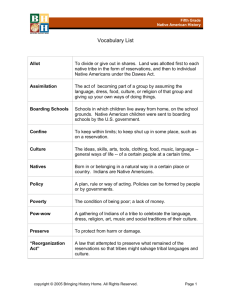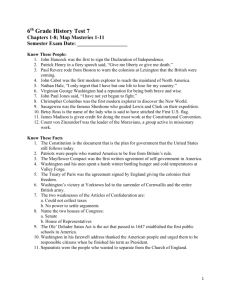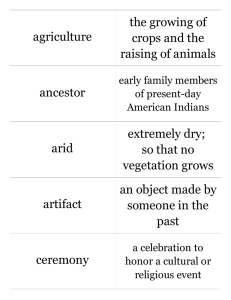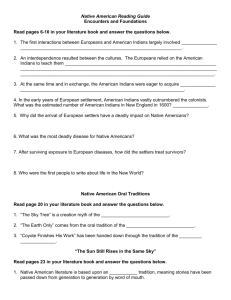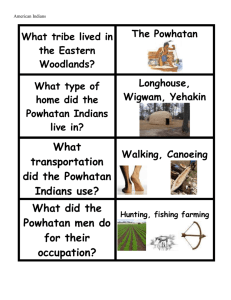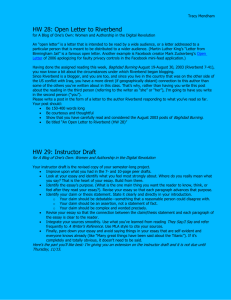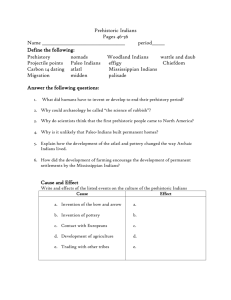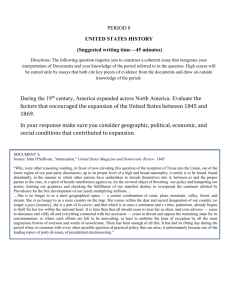Newsletter - Friends of Riverbend Park
advertisement
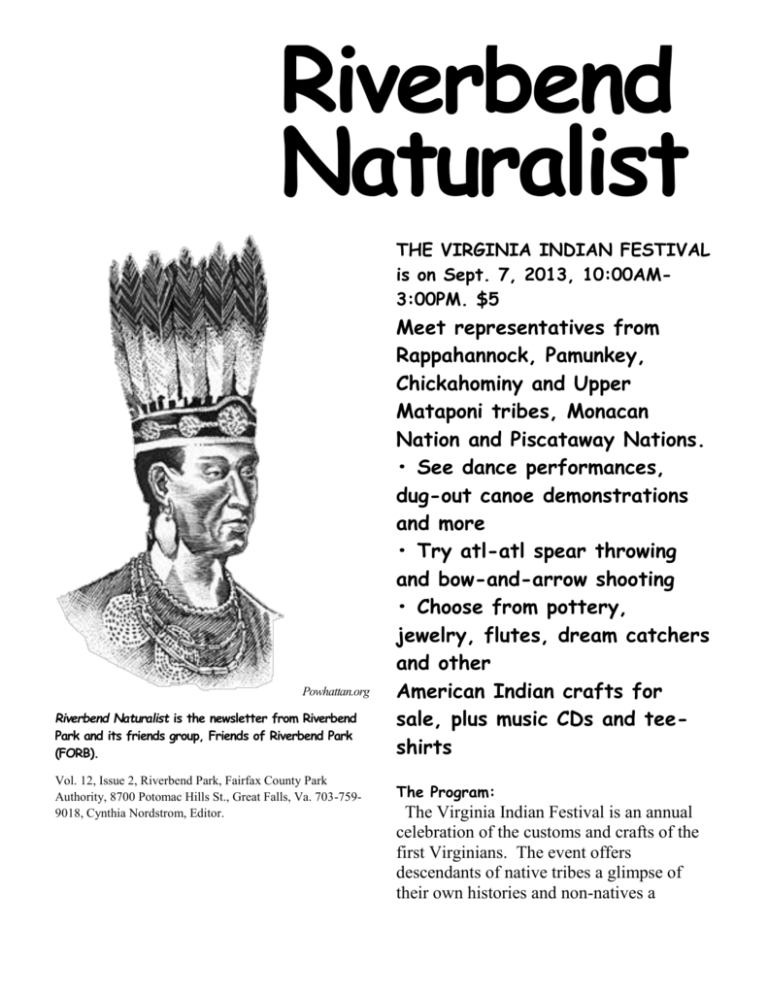
Riverbend Naturalist THE VIRGINIA INDIAN FESTIVAL is on Sept. 7, 2013, 10:00AM3:00PM. $5 Powhattan.org Riverbend Naturalist is the newsletter from Riverbend Park and its friends group, Friends of Riverbend Park (FORB). Vol. 12, Issue 2, Riverbend Park, Fairfax County Park Authority, 8700 Potomac Hills St., Great Falls, Va. 703-7599018, Cynthia Nordstrom, Editor. Meet representatives from Rappahannock, Pamunkey, Chickahominy and Upper Mataponi tribes, Monacan Nation and Piscataway Nations. • See dance performances, dug-out canoe demonstrations and more • Try atl-atl spear throwing and bow-and-arrow shooting • Choose from pottery, jewelry, flutes, dream catchers and other American Indian crafts for sale, plus music CDs and teeshirts The Program: The Virginia Indian Festival is an annual celebration of the customs and crafts of the first Virginians. The event offers descendants of native tribes a glimpse of their own histories and non-natives a 2 glimpse of what Europeans found when they arrived on the shores of Fairfax County nearly 400 years ago. Admission is $5.00 per person. While the festival is enjoyed by all ages, there is a special focus on activities appropriate for grade-school children who will be studying Indians in their Virginia and American history classes this year. The program will consist of the following demonstrations. The Mattaponi tribe demonstrates the domestic life of the tribe as it existed at the turn of the last century. Visitors have a chance to grind corn, to see how Indians made houses, cooking utensils and clothes out of materials collected from the wild, and to see and savor how food was preserved through drying and smoking. The smells of wood fire and smoking meat will permeate the park. The Rappahannock tribe performs and explains traditional dances. Indians used dance to celebrate special occasions and also as a diplomatic gesture. The Rappahannock drummers mesmerize visitors with their rhythms, drawing people from all over the park to the circle where the dancers gather. The Pamunkey tribe brings their beautiful pottery and explains the symbols in the decoration and the uses of the various pieces. A traditional Chickahominy storyteller shows how the tribe’s history and values were passed down in stories. Craftsmen show how Indians made canoes, fire and tools and how they tanned deer hide. Children can try throwing spears (atlatl), shooting with bow and arrow and napping flint. The Historical Significance: Of approximately 30 tribes that lived in Virginia when Jamestown was settled, 8 survive today. In addition to the 4 who put on the festival, there are the Eastern Chickahominy, Monacan, Nansemond and Upper Mattaponi. Most of the tribes have fewer than 100 members living on the reservations, primarily in the Middle Peninsula. When Captain John Smith first glimpsed the Potomac River in the early 17th century, the banks were lined with native fishermen and the water teemed with shad, sturgeon and herring. The trail that still hugs the riverbank through Riverbend Park provided Indians and Colonial settlers access to fishing holes and was a well-established trade route. Virginia Indians traded with the Seneca nation who lived north of the river, crossing just upstream of today’s park boundaries. Although a large part of what we know about Virginia Indians at the time of the English settlement comes from archaeological digs and diaries, the native people who put on the demonstrations and exhibits at the Indian Festival are dedicated to preserving the oral, handicraft and spiritual traditions of their ancestors, ensuring that their children and the children of their fellow tribesmen can in turn carry on the traditions in generations to come. Their trip to Riverbend Park is symbolic of their ancestors’ trips to fish and trade. By Cathy Mayes, Past FORB President 3 The Dogue Indians—Our Local Tribe By Ruth Baja Williams By the time Captain John Smith and a party of 14 men explored and mapped the lands bordering the Potomac River in 1608, the local American Indians had been a settled agricultural people for almost two thousand years. Smith and other early explorers recorded eleven different nations or Indian groups living along the lower Potomac River. Before setting out on his journey up the river, Smith had been warned by friendly Indians that Powhatan, the paramount chief and chief of the Algonquian Federation, had orders out to betray him, (according to George Brown in a 1991 newsletter of Historic Prince William). Proceeding with caution, Smith encountered the Chicacoans, Matchotics, and Patawomecks who were hostile toward him. It was with relief then to be welcomed with a friendly reception at Tauxenent on the Occoquan River. Tauxenent was the main village of the Dogue Indians. The werowance, chief, of the Dogue tribe gave the Englishmen a feast. Smith estimated the size of the tribe to be from 135 to 170, which included 40 bowmen. The Dogues hunted and fished and planted corn, pumpkins, sunflowers, squash, beans, and tobacco. They lived in longhouses, arbor-like structures of bent poles covered with bark or reed mats. Tauxenent was on the north bank of the Occoquan River. George Brown speculates that it may have been on the hill where the Lazy Susan Dinner Theatre is now located. The Dogue Indians also dwelt in four hamlets, each ruled by a lesser werowance. The hamlet of Pamacocack was located on Quantico Creek. Namassingakent was situated on the north bank of Dogue Run, Assaomeck, on the south side of Hunting Creek, and Namoraughquend, near presentday Roosevelt Island. Smith traveled only a short distance from the village of Tauxenent before coming to Great Falls. One of Smith's men reported seeing beaver, otters, bears, martins, minks, and an abundance of fish. The Dogue's werowances were male, although their position was inherited through female lineage. The werowances had absolute power of life and death over tribal members. They were allowed to have as many wives as they could support. It is said that Powhatan had more than one hundred. Village hierarchy included an advisor; a priest who was in charge of the temple and gave advice on matters of war; and a shaman. Below these officials were the common Indians and at the bottom rung of this society were the war prisoners. The Dogue Indians were members of the Algonquian Federation, but at the time of Smith's arrival at Tauxenent, the Dogue disliked Powhatan, possibly because Powhatan was demanding ever more tribute. Far from Powhatan's center of power, the Dogues may have viewed the English as a potential ally, and thus wished to win their friendship. In the first half of the 17th century the area around the Potomac basin was seething with intertribal wars, rivalries and alliances made, then broken. Archeological digs show 4 Algonquian settlements were palisaded, or protected by fences. Into this mix came the English. Intertribal wars evolved into AngloIndian wars and more specifically AngloPowhatan wars. Whatever struggles were going on, there was no stopping the encroachment of the English settlers. Evidence of European-Indian contact was found at the Little Marsh Creek archeological excavation site: two chip flints and a gunflint. The gunflints suggest English presence during the second quarter of the seventeenth century. As European settlement spread, the Indians were forced off their lands and groups merged. The English corrupted the tribal name of Tauxenent first to Taux, then to Toags, Doeggs, Doegs and finally Dogue. Stephen Potter, author of Commoners, Tribute, and Chiefs: The Development of Algonquian Culture in the Potomac Valley (University Press of Virginia, 1993) states that around 1650, the Dogues were still living in what is now Mason Neck. By 1654, some of the Dogues may have moved to lands along the Rappahannock. The origins of the Dogue Indians are lost in the mists of ancient history. What is known is that the Dogue Indians belonged to the Algonquian language group. Historical linguists agree that Eastern Algonquian languages probably are not native to the Middle Atlantic. "...the putative homeland for Eastern and Central Algonquian languages is somewhere in the Great Lakes region..." (Potter). The Dogues' heritage is evident in local place names: Occoquan, at the end of the water; Marumsco, at the island rock; Quantico, by the long stream; and the most common name of all, Potomac, trader. Supervisor Foust Announces Appointment of Richard Sullivan to Fairfax County Park Authority Board FORB recently received the following notice from Dranesville Supervisor John Foust: Dear Dranesville Resident, I’m pleased to announce the recent appointment of Richard “Rip” Sullivan as the Dranesville representative to the Fairfax County Park Authority Board. His appointment is effective immediately. Rip is a lawyer with the Reed Smith law firm and has a long history of community service including the McLean Community Foundation where he served as Chairman; the Dranesville Budget Task Force where he served as Chairman for four years; the Fairfax County Housing and Redevelopment Authority where he served as vice chair; the Fairfax Transportation Advisory Commission; and, the Fairfax Consumer Protection Commission. He was also appointed by the governor to serve on the Virginia Commission on Civics Education in 2006. I have worked for many years with Rip. He has a great track record of dedicated and effective public service in our community. His experience will prove invaluable as he works with the community and me on park matters already underway as well as new park initiatives. Rip will be a great asset to the Park Authority Board and will serve as a 5 strong steward for the County’s treasured park lands. This year, FORB has supported Traveling Players with a $500 grant. Rip was appointed to fill the vacancy created on the Park Board when Dranesville’s previous representative, Kevin Fay, resigned. Kevin served as our Dranesville representative for ten years and was Park Authority Vice Chairman. We were fortunate to have such a dedicated partner in Kevin. I wish him the best in his future endeavors. On Thursday, August 22nd at 7:30pm, the Traveling Players’ Commedia Troup will present The Great War, under the stars at Riverbend Park. Sincerely, John Foust John W. Foust Dranesville District Supervisor ___________ FORB thanks Kevin Fay for his support for Riverbend over the years, and looks forward to working with Mr. Sullivan on items of interest to the Fairfax County Park Authority Board and the Riverbend Park community. COMMEDIA DELL’ARTE PLAY, THE GREAT WAR, TO BE PRESENTED AT RIVERBEND PARK Traveling Players of Great Falls, a local school for the arts for students in grades 5 through 12, is dedicated to bringing great theatre into the outdoors through a thriving summer camp, traveling ensembles, and year-round acting classes and workshops. In the play, the rumor of war comes to a sleepy Italian town. And even though it’s only a rumor, the town’s citizens boldly mount a defense against…whoever it is that’s attacking. Soon, characters from all walks of life are joining the army, itching to prove their bravery, make some quick cash, or maybe just get a free meal. Prudence, reason, and common sense prove no match for good old mass hysteria in this anarchic slapstick comedy. Come join the fun and spend an evening outside! Bring flashlights, blankets, chairs, or a picnic. Sorry, no alcoholic beverages allowed. Field Trip Sign Ups -- Attention All Teachers! Sign ups for field trips at Riverbend Park begin on the 28th of August. Science, natural history and Virginia history topic areas are included. The park programs also cover required Virginia State School Board Standard of Learning (SOL) points for each grade level. Call Riverbend Park at 703759-9018 to sign up your class. Riverbend is on the Web 6 http://www.fairfaxcounty.gov/parks/riverben d/index. The website includes links to Riverbend’s hiking trails, Visitor Center and programs and events. There also links to information about the Potomac River as well as the picnic areas and wildflowers and wildlife at the park. Volunteers may sign up at: http://www.fairfaxcounty.gov/parks/voluntee r/rmdvol-opps.htm, or contact John Callow at 703-759-9018. Friends of Riverbend Park (FORB) is a 501c(3) non-profit corporation and citizen’s group dedicated to the responsible stewardship and preservation of the undisturbed natural beauty at Riverbend Park on the Potomac River and to safeguarding the Park as a natural 'classroom' for the inspiration, enjoyment, and education of all visitors. If you would like to contribute, please send your tax deductible donation to FORB, P.O. BOX 1481, Great Falls, Va. 22006.
